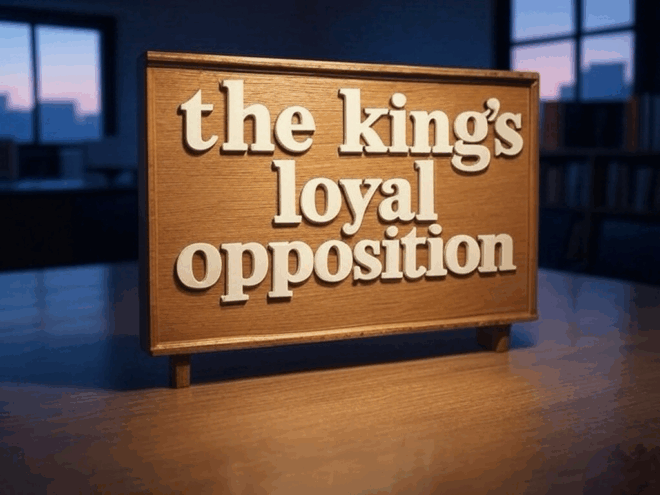
Abstract
In a political duopoly, the opposition is a cornerstone of democratic governance, tasked with holding the government accountable, enriching policy debate, and presenting itself as a credible alternative government. For this role to be fulfilled, the opposition must be constructive, balancing criticism with substantive policy proposals. However, ideological rigidity and an overreliance on negativity can undermine this function, weakening democratic competition and public trust. This paper examines Peter Dutton’s leadership of the Australian Liberal-National Coalition (2022–present), arguing that its predominantly negative approach, shaped by conservative ideological constraints, fails to meet the standards of constructive opposition. By comparing Dutton’s strategy to UK opposition leaders – Tony Blair, Jeremy Corbyn, and Keir Starmer – and grounding the analysis in political theory, the paper explores how ideology can hinder effective opposition and proposes principles for strengthening democratic governance.
Introduction
In democratic systems characterised by a political duopoly – where two major parties dominate electoral politics – the opposition plays a pivotal role in ensuring accountability, fostering debate, and providing voters with a meaningful choice. Beyond mere criticism, the opposition must offer constructive policy alternatives and demonstrate readiness to govern, serving as the “government-in-waiting.” Political theory emphasises that this dual role of opposition – challenging the government while preparing to lead – is essential for a competitive and vibrant democracy (Dahl, 1971; Sartori, 1966). However, ideological rigidity, whether rooted in populism, conservatism, or progressivism, can constrain the opposition’s ability to engage constructively, leading to negativity, polarisation, and a diminished democratic discourse.
In Australia, the Liberal-National Coalition, led by Peter Dutton since 2022, exemplifies an opposition struggling to balance its ideological commitments with the demands of constructive engagement. Dutton’s leadership has been criticised for prioritising relentless criticism of the Labor government under Anthony Albanese over the development of substantive policy alternatives, a strategy shaped by conservative ideological currents within the Coalition. This approach not only undermines the Coalition’s electoral prospects but also weakens the democratic process by stifling policy innovation and eroding public trust.
To explore these dynamics, this paper integrates a robust theoretical framework, drawing on concepts from democratic theory, ideology, and opposition studies. It compares Dutton’s leadership with three UK opposition leaders – Tony Blair (1994–1997), Jeremy Corbyn (2015–2020), and Keir Starmer (2020–2024) – whose experiences illustrate the interplay of ideology and opposition strategy in a similar duopoly. The paper argues that ideological constraints, when unchecked, undermine constructive opposition, with broader implications for democratic governance. By analysing these cases, the paper proposes principles for fostering a more effective opposition, ensuring that political duopolies remain dynamic and responsive to public needs.
Theoretical Framework: Opposition, Ideology, and Democracy
The Role of Opposition in a Political Duopoly
Democratic theory underscores the opposition’s centrality in a political duopoly. Robert Dahl’s concept of “polyarchy” posits that democracy requires not only competitive elections but also an opposition capable of challenging the government and offering a viable alternative (Dahl, 1971). Giovanni Sartori further distinguishes between “responsible” and “irresponsible” oppositions, with the former contributing to governance through constructive criticism and policy proposals, and the latter resorting to obstructionism or negativity (Sartori, 1966). In a duopoly, the opposition’s functions include:
1. Accountability: Scrutinising government actions to ensure transparency and competence.
2. Policy Enrichment: Proposing alternatives to stimulate debate and refine government policies.
3. Electoral Choice: Providing voters with a clear distinction between competing visions.
4. Governance Preparation: Developing leadership and policies to demonstrate readiness to govern.
These functions require the opposition to balance criticism with constructive engagement, a balance that ideology can disrupt.
Ideology and Opposition Behaviour
Ideology, defined as a coherent set of beliefs and values shaping political action (Freeden, 1996), profoundly influences opposition strategies. While ideology provides a framework for policy development, excessive adherence to ideological purity can hinder constructive opposition in several ways:
1. Polarisation: Ideological rigidity can lead to divisive rhetoric, alienating moderate voters and reducing opportunities for bipartisan collaboration. For example, conservative ideologies emphasising tradition and limited government may resist pragmatic policy innovations, while progressive ideologies may prioritise ideological purity over electoral pragmatism.
2. Policy Stagnation: An overreliance on ideological principles can stifle creative policy solutions, as parties cling to outdated or narrowly appealing platforms.
3. Negativity Over Substance: Ideology can foster a reactive opposition, where criticism of the government’s divergence from ideological norms overshadows the development of positive alternatives.
4. Internal Division: Ideological factions within a party can undermine unity, weakening the opposition’s ability to present a cohesive alternative.
Political scientist Ian Shapiro argues that ideological commitments often lead oppositions to prioritise “symbolic politics” over substantive governance, a trap that undermines their democratic role (Shapiro, 2003). In a duopoly, where the opposition is expected to be a government-in-waiting, ideological rigidity can thus erode its legitimacy and effectiveness.
Implications for Democracy
An opposition hindered by ideology and negativity has far-reaching consequences for democracy. It risks:
• Eroding Public Trust: Persistent negativity fosters cynicism, as voters perceive politics as a series of conflicts rather than a problem-solving arena (Hibbing & Theiss-Morse, 2002).
• Weakening Policy Debate: A lack of constructive proposals limits the government’s incentive to innovate, reducing the quality of governance.
• Threatening Democratic Stability: An ineffective opposition creates a de facto one-party system, undermining the competitive nature of democracy and enabling unchecked government power (Linz & Stepan, 1996).
This theoretical lens frames the analysis of Peter Dutton’s leadership and its UK counterparts, highlighting how ideology shapes opposition behaviour and its democratic impact.
Peter Dutton’s Leadership: Ideology and Negativity in Australia
Context
Peter Dutton assumed leadership of the Liberal-National Coalition following its defeat in the 2022 Australian federal election. The Coalition faced a Labor government under Anthony Albanese, internal divisions between moderate and conservative factions, and the loss of key seats to independents and the Greens. Dutton’s challenge was to unify the party, rebuild its electoral base, and position the Coalition as a credible alternative by the next election (expected by 2025).
Ideological Underpinnings
Dutton’s leadership is shaped by the Coalition’s conservative ideology, which emphasises economic liberalism, traditional values, and skepticism of rapid social or environmental change. This ideology, particularly its right-wing populist strain, prioritises issues like immigration control, national security, and economic deregulation, appealing to the Coalition’s rural and suburban base. However, this ideological stance has constrained the opposition’s ability to engage constructively.
1. Constructive Policy Development: The Coalition under Dutton has been criticised for its lack of substantive policy alternatives. On climate change, the Coalition has opposed Labor’s emissions reduction targets and renewable energy initiatives, aligning with conservative skepticism of environmental regulation, but has not proposed a comprehensive alternative (e.g., a detailed nuclear energy plan). Similarly, on economic issues like cost-of-living pressures, Dutton has attacked Labor’s policies without offering a robust economic strategy. This reflects an ideological preference for critiquing government intervention over developing pragmatic solutions, contrasting with historical oppositions like John Howard’s policy-rich “Fightback!” package in the 1990s.
2. Tone and Approach: Dutton’s rhetoric is heavily negative, shaped by a populist conservative ideology that emphasises cultural and economic grievances. His opposition to the 2023 Indigenous Voice to Parliament referendum, for instance, framed the proposal as divisive and risky, resonating with conservative voters but failing to offer an alternative vision for Indigenous reconciliation. This approach mirrors the “culture war” tactics of global conservative movements, prioritising ideological purity over broad appeal. Unlike constructive oppositions, Dutton’s strategy alienates moderate voters and urban electorates, limiting the Coalition’s electoral recovery.
3. Electoral Impact: Polls, such as Newspoll (2025), show the Coalition trailing Labor in two-party-preferred voting (approximately 48 – 52%), with Dutton’s approval ratings lagging behind Albanese’s. The conservative ideology driving Dutton’s leadership has consolidated the Coalition’s base but struggles to reclaim progressive and independent-held seats lost in 2022. This ideological rigidity mirrors the pitfalls described by Shapiro (2003), where symbolic politics overshadows electoral pragmatism.
4. Democratic Contribution: Dutton’s ideologically driven negativity undermines democratic discourse. By focusing on criticism over solutions, the Coalition reduces complex issues to simplistic narratives, fostering voter cynicism (Australian Election Study, 2022). The absence of constructive engagement weakens the opposition’s role as a government-in-waiting, risking a less competitive democracy.
Theoretical Analysis
Dutton’s leadership exemplifies Sartori’s “irresponsible” opposition, where ideological commitments – in this case, conservative populism – prioritise obstruction over governance. The Coalition’s reluctance to embrace pragmatic policies (e.g., on climate or housing) reflects Freeden’s (1996) observation that ideologies can constrain political actors by prioritising core beliefs (e.g., limited government, cultural traditionalism) over adaptive solutions. This ideological rigidity fosters negativity, as the opposition defines itself against the government rather than for a positive vision, undermining its democratic role as per Dahl’s (1971) polyarchy framework.
Comparison with UK Opposition Leaders
To contextualise Dutton’s leadership, this section compares it to three UK opposition leaders – Tony Blair (1994–1997), Jeremy Corbyn (2015–2020), and Keir Starmer (2020–2024) – whose strategies illustrate the interplay of ideology and constructive opposition in a political duopoly.
Tony Blair (1994–1997)
Context: Blair led Labour after four consecutive election defeats, facing a fatigued Conservative government. His task was to reposition Labour as a centrist, electorally viable alternative.
Ideological Influence: Blair’s “New Labour” embraced a pragmatic, third-way ideology, blending market-friendly policies with social justice. This ideological flexibility allowed Labour to transcend traditional left-wing dogmas, developing policies like the minimum wage, devolution, and public service investment.
Analysis:
1. Constructive Policy Development: Blair’s opposition was highly constructive, offering a detailed platform that addressed voter concerns (e.g., economic stability, education). Unlike Dutton’s policy reticence, Blair’s ideological pragmatism enabled innovative solutions.
2. Tone and Approach: Blair’s positive, inclusive rhetoric contrasted with Dutton’s negativity. By moderating Labour’s ideology, he appealed to both traditional and swing voters, avoiding the polarisation of conservative populism.
3. Electoral Impact: Blair’s strategy led to a landslide victory in 1997 (418 seats to 165), demonstrating the electoral power of constructive opposition. Dutton’s ideological rigidity, by contrast, limits the Coalition’s appeal.
4. Democratic Contribution: Blair’s opposition revitalised UK democracy by fostering competitive debate and restoring trust in the two-party system, unlike Dutton’s contribution to cynicism.
Comparison: Blair’s ideological flexibility enabled a constructive opposition, highlighting the pitfalls of Dutton’s conservative rigidity. Blair’s success underscores the democratic benefits of transcending ideological constraints, a lesson Dutton has not embraced.
Jeremy Corbyn (2015–2020)
Context: Corbyn led Labour during a turbulent period of Conservative rule, marked by austerity and Brexit. Leading a divided party, he faced challenges in uniting Labour’s left-wing base and centrist MPs.
Ideological Influence: Corbyn’s socialist ideology emphasised state intervention, anti-imperialism, and wealth redistribution. This ideological purity energised activists but alienated moderate voters, contrasting with Blair’s pragmatism.
Analysis:
1. Constructive Policy Development: Corbyn’s opposition was more policy-driven than Dutton’s, with proposals like nationalising utilities and abolishing tuition fees. However, these policies, rooted in ideological purity, were perceived as unrealistic, limiting their pragmatic appeal. Dutton’s lack of policy substance reflects a different ideological failure – conservative inertia rather than socialist ambition.
2. Tone and Approach: Corbyn’s critical tone, like Dutton’s, focused on government failures (e.g., austerity) but was paired with an ideological vision. Both leaders’ divisive rhetoric – Corbyn’s on class and Brexit, Dutton’s on immigration and culture – alienated swing voters.
3. Electoral Impact: Corbyn’s Labour narrowly lost in 2017 but was crushed in 2019 (202 seats to 365), reflecting ideological overreach. Dutton’s polling deficits suggest similar electoral challenges, though his lack of policy clarity offers less definition than Corbyn’s platform.
4. Democratic Contribution: Corbyn’s ideological divisiveness polarised discourse, weakening Labour’s role as a government-in-waiting. Similarly, Dutton’s negativity undermines democratic competition, though Corbyn’s policy focus contributed more to debate.
Comparison: Corbyn and Dutton share ideological constraints – socialism for Corbyn, conservatism for Dutton – that foster negativity and limit broad appeal. However, Corbyn’s policy ambition contrasts with Dutton’s inertia, illustrating different ways ideology can undermine constructive opposition.
Keir Starmer (2020–2024)
Context: Starmer led Labour after Corbyn’s 2019 defeat, facing a dominant Conservative government. His goal was to rebuild Labour’s credibility and appeal to a broad electorate.
Ideological Influence: Starmer adopted a pragmatic, centre-left ideology, prioritising competence and unity over ideological purity. This flexibility enabled Labour to address voter priorities like economic stability and public services.
Analysis:
1. Constructive Policy Development: Starmer’s “five missions” (e.g., economic growth, clean energy) offered a clear, pragmatic platform, unlike Dutton’s policy vacuum. His ideological moderation facilitated constructive engagement.
2. Tone and Approach: Starmer’s measured tone criticised Conservative failures (e.g., Partygate) while emphasising Labour’s vision, contrasting with Dutton’s divisive populism. His approach broadened Labour’s appeal, avoiding ideological polarization.
3. Electoral Impact: Starmer’s strategy led to a landslide in 2024 (412 seats to 121), proving the efficacy of constructive opposition. Dutton’s trailing polls highlight the electoral cost of ideological negativity.
4. Democratic Contribution: Starmer’s opposition strengthened UK democracy by restoring Labour’s credibility and elevating discourse, unlike Dutton’s contribution to cynicism and polarisation.
Comparison: Starmer’s pragmatic ideology enabled a constructive opposition, mirroring Blair’s success and highlighting Dutton’s failure to transcend conservative constraints. Starmer’s triumph underscores the democratic value of ideological flexibility.
Ideology and the Undermining of Constructive Opposition
The comparison reveals a common thread: ideological rigidity undermines constructive opposition, with distinct manifestations:
1. Conservative Populism (Dutton): Dutton’s adherence to conservative populism fosters negativity and policy inertia, prioritising cultural grievances over substantive solutions. This aligns with Shapiro’s (2003) critique of symbolic politics, where ideological posturing overshadows governance.
2. Socialist Purity (Corbyn): Corbyn’s ideological commitment to socialism produced bold but polarising policies, limiting electoral appeal. His divisiveness reflects Sartori’s (1966) “irresponsible” opposition, though his policy focus surpasses Dutton’s.
3. Pragmatic Flexibility (Blair, Starmer): Blair and Starmer’s ideological moderation enabled constructive engagement, demonstrating that transcending ideological constraints fosters policy innovation, broad appeal, and democratic vitality.
These patterns confirm Freeden’s (1996) argument that ideologies shape political behaviour but can constrain adaptability. Dutton’s conservative ideology, like Corbyn’s socialism, fosters a reactive opposition, undermining the democratic functions outlined by Dahl (1971) – accountability, policy enrichment, electoral choice, and governance preparation.
Implications for Australian Democracy
Dutton’s ideologically driven negativity has profound implications for Australian democracy:
1. Eroding Public Trust: Persistent negativity, rooted in conservative grievances, fosters cynicism, as voters perceive politics as divisive rather than solution-oriented (Hibbing & Theiss-Morse, 2002). The Australian Election Study (2022) notes declining trust in politicians, exacerbated by unconstructive opposition.
2. Weakening Policy Debate: The Coalition’s lack of policy alternatives, driven by ideological skepticism of government intervention, stifles innovation. For example, its opposition to Labor’s climate policies without a credible alternative limits Australia’s ability to address global challenges.
3. Threatening Democratic Stability: An ineffective opposition, as per Linz and Stepan (1996), risks a de facto one-party system, reducing electoral pressure on Labor and enabling complacency. Dutton’s failure to present a viable alternative weakens democratic competition.
4. Polarisation: The Coalition’s populist rhetoric, echoing global conservative trends, deepens social divisions, undermining the inclusive discourse necessary for democratic cohesion.
The UK cases illustrate that constructive opposition, freed from ideological rigidity, mitigates these risks. Blair and Starmer’s pragmatic approaches restored trust, enriched debate, and strengthened competition, offering a blueprint for Australia.
Toward a Constructive Opposition
To overcome ideological constraints and fulfil its democratic role, the Coalition under Dutton could have adopted the following principles, informed by theory and comparative analysis:
1. Embraced Pragmatic Policy Development: Develop evidence-based policies addressing key issues (e.g., climate, housing, economy), as Blair and Starmer did, transcending conservative skepticism of intervention.
2. Balance Criticism with Solutions: Pair ideological critiques with positive alternatives, avoiding Sartori’s “irresponsible” opposition trap. For example, propose a detailed energy plan rather than merely opposing renewables.
3. Adopted a Moderate Tone and Appeal: Adopt Starmer’s inclusive rhetoric to broaden electoral appeal, mitigating the polarisation of conservative populism.
4. Engaged Bipartisanship: Collaborate on national issues (e.g., national security), demonstrating statesmanship and governance readiness, as Blair did with devolution.
5. Unified Ideological Factions: Bridge the Coalition’s moderate-conservative divide, as Starmer unified Labour, to present a cohesive alternative.
These principles align with Dahl’s (1971) polyarchy framework, ensuring the opposition fulfils its democratic functions while navigating ideological constraints.
Conclusion
In a political duopoly, a constructive opposition is essential for democratic vitality, balancing accountability with policy innovation and electoral choice. However, ideological rigidity can undermine this role, fostering negativity and weakening governance. Peter Dutton’s leadership of the Australian Liberal-National Coalition, shaped by conservative populism, exemplifies this failure, prioritising criticism over substantive alternatives. Compared to UK opposition leaders – Blair and Starmer’s pragmatic successes, and Corbyn’s ideological struggles – Dutton’s approach highlights the democratic costs of ideological constraints.
Theoretically, Dutton’s negativity aligns with Sartori’s “irresponsible” opposition and Shapiro’s symbolic politics, eroding trust, stifling debate, and threatening democratic stability. By contrast, Blair and Starmer’s ideological flexibility demonstrates that constructive opposition strengthens democracy. For Australia’s duopoly to thrive, the Coalition must transcend conservative rigidity, adopting pragmatic policies, inclusive rhetoric, and bipartisan engagement. Without such a shift, Dutton’s leadership risks not only electoral defeat but also a diminished democratic process, underscoring the critical link between ideology, opposition, and democratic health.
References
• Dahl, R. A. (1971). Polyarchy: Participation and Opposition. Yale University Press.
• Freeden, M. (1996). Ideologies and Political Theory: A Conceptual Approach. Oxford University Press.
• Hibbing, J. R., & Theiss-Morse, E. (2002). Stealth Democracy: Americans’ Beliefs About How Government Should Work. Cambridge University Press.
• Linz, J. J., & Stepan, A. (1996). Problems of Democratic Transition and Consolidation. Johns Hopkins University Press.
• Sartori, G. (1966). “Opposition and Control: Problems and Prospects.” Government and Opposition, 1(2), 149–165.
• Shapiro, I. (2003). The State of Democratic Theory. Princeton University Press.
• Australian Election Study. (2022). Trends in Australian Political Opinion. Australian National University.
• Newspoll. (2025). Australian Federal Voting Intention and Leadership Approval. The Australian.
• UK Election Results (1997, 2017, 2019, 2024). UK Electoral Commission.


